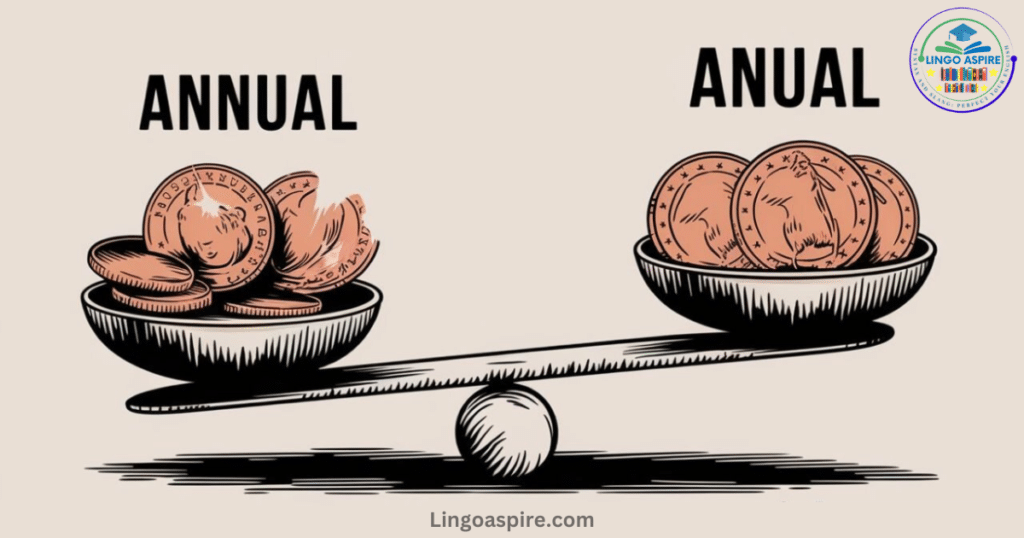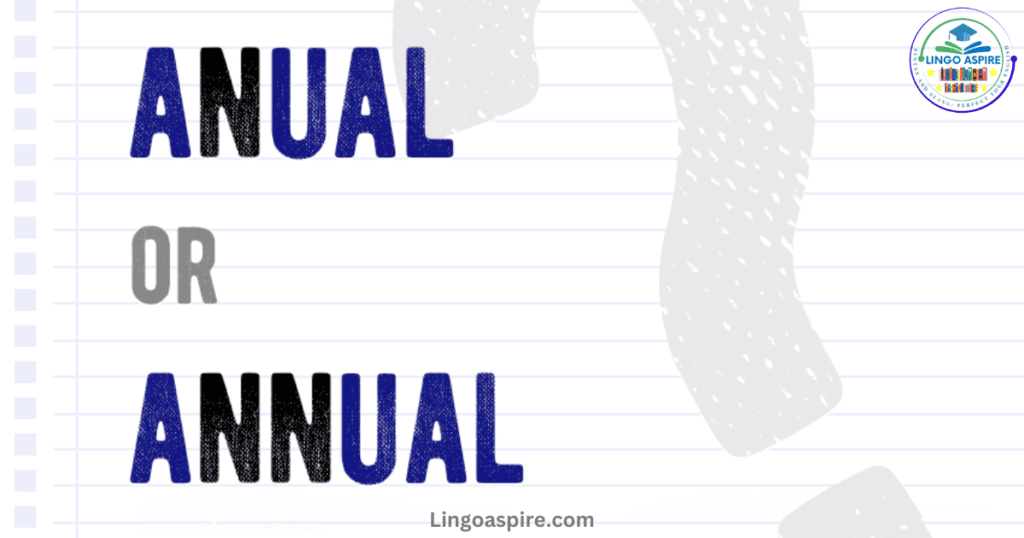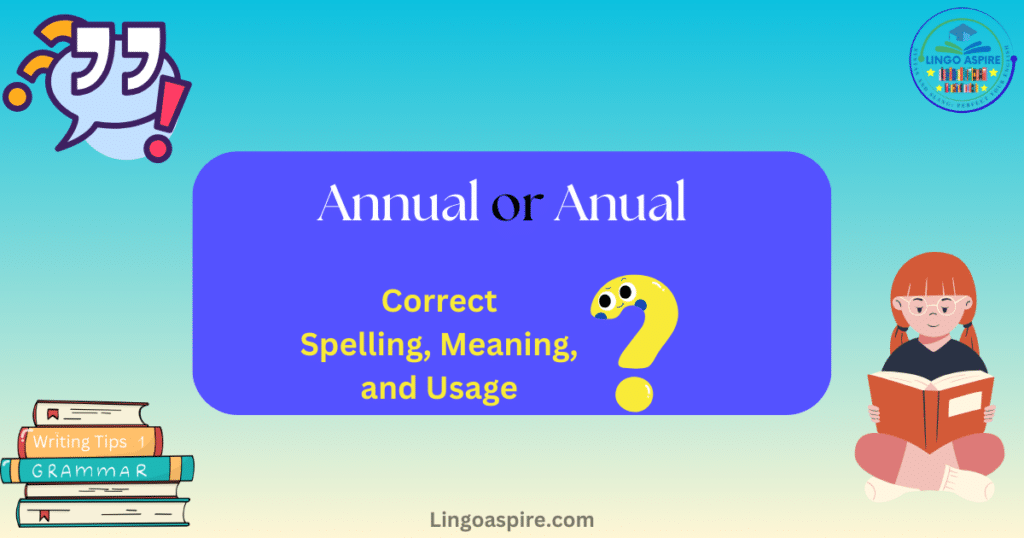Spelling mistakes are common, but some can significantly affect the clarity of your writing. One frequent error involves the words annual or anual. While these two words look similar, only one of them is correct. You’re not alone if you’ve ever been unsure about which to use. Let’s explore the differences, understand the correct usage, and see why accuracy matters in casual and professional settings.
What’s the Correct Spelling: Annual or Anual?

The correct spelling is “annual”. The word “anual” is a common misspelling and is not recognized as valid in English. “Annual” refers to something that happens once a year or lasts for a year. The word comes from the Latin root “annus,” meaning year. This etymological background firmly establishes “annual” as the proper spelling.
Many people mistakenly spell it as “anual” due to typographical errors or the omission of the second “n.” These mistakes often happen in casual writing, on digital platforms, or when someone is unfamiliar with the word’s origin. Correct spelling matters because “annual” is frequently used in professional, academic, and financial contexts where accuracy is essential.
Why Is “Anual” a Common Misspelling?
“Anual” is a common misspelling because of its phonetics and simplicity. When spoken, the double “n” sound in “annual” might not be distinctly heard, leading to errors when writing the word. Additionally, people often rush their writing, skipping the second “n” unintentionally. Another reason is the influence of regional accents, where the pronunciation of “annual” may differ slightly.
Interestingly, this error highlights how spelling and pronunciation don’t always align in English. Unlike other languages where words are spelled phonetically, English often retains its historical spellings. This can confuse learners and even native speakers, making “anual” a persistent error.
What Does “Annual” Mean?
The word “annual” serves as both an adjective and a noun. As an adjective, it describes events, occurrences, or activities that take place once every year. Examples include annual holidays, annual subscriptions, or annual reports. As a noun, it can refer to publications released yearly, such as annual magazines or company yearbooks.
In everyday life, “annual” is often associated with things that recur regularly over time. For instance, an annual celebration might mark a special occasion like a birthday or an anniversary. Businesses frequently use the term when discussing performance reports, employee reviews, or financial summaries, emphasizing the importance of its correct spelling in professional communication.
Common Examples of “Annual” in Use
The versatility of “annual” makes it a valuable word in various contexts. In business, it appears in terms like annual revenue, annual budget, and annual meetings. These phrases highlight periodic reviews or evaluations crucial for organizational growth. In academia, “annual” often describes conferences, seminars, or events that bring experts together to share ideas once a year.
In personal life, “annual” is common when discussing subscriptions, such as annual memberships to gyms or streaming services. Holidays, festivals, and local fairs are also described as “annual” events because they follow a predictable yearly schedule. Here are some examples of how “annual” is used:
| Category | Examples |
|---|---|
| Business | Annual reports, annual reviews |
| Academic | Annual conferences, journals |
| Personal Life | Annual celebrations, subscriptions |
| Government | Annual budgets, annual tax returns |
These examples underline why spelling “annual” correctly is essential for clear communication.
Synonyms for “annual” and the incorrect word “annual”
| Word | Synonyms | Notes |
|---|---|---|
| Annual | Yearly, Once-a-year, Per annum, Periodic, Cyclical | Refers to events, reports, or activities occurring once every year. |
| Anual | None (Misspelled word) | “Anual” is not a valid word in English; it’s simply a common spelling error for “annual.” |
Since “anual” is incorrect, it doesn’t have true synonyms. However, the correct term “annual” has many synonyms that can be used interchangeably depending on the context. Let me know if you’d like to dive deeper into its applications or etymology!
Side-by-Side Comparison of “Anual or Annual”
To understand the distinction between “anual” and “annual,” here’s a comparison table:

| Aspect | “Annual” | “Anual” |
|---|---|---|
| Spelling | Correct | Incorrect |
| Meaning | Recurring yearly | Not a word in English |
| Examples of Usage | Annual events, annual reports | N/A |
| Origin | Latin: “annus” (year) | Typographical error |
This table makes it clear that “anual” should be avoided in all forms of writing.
The Etymology and Origin of “Annual”
The word “annual” has deep linguistic roots. It originates from the Latin word “annus,” meaning “year.” Over centuries, the term has evolved through Old French and Middle English to become the modern “annual” we use today. This historical journey highlights the importance of preserving its correct spelling and pronunciation.
Understanding its etymology also helps distinguish related words like “annually” (adverb) or “annum” (a Latin term often used in legal or financial documents). These derivatives maintain the core meaning tied to yearly occurrences, reinforcing the consistency of the “nn” in “annual.”
Why Correct Spelling Matters: SEO, Professionalism, and Clarity
Accurate spelling isn’t just about grammar; it influences how others perceive your work. For instance, in professional settings, a typo like “anual” in an annual report could undermine your credibility. Digital content creators, such as bloggers and marketers, must also prioritize spelling for SEO (Search Engine Optimization) purposes. Search engines rank content with correct keywords higher, making “annual” a critical term to get right.
Clarity is another vital factor. A reader encountering “anual” might be confused or distracted, impacting the effectiveness of your communication. Whether you’re writing an email, a presentation, or a social media post, spelling “annual” correctly ensures professionalism and readability.
Real-World Scenarios Where “Annual” Is Used
“Annual” appears in numerous real-life situations. In professional settings, it’s commonly seen in phrases like annual audits, annual budgets, and annual performance reviews. These terms indicate recurring activities essential for planning and evaluation.
In everyday scenarios, “annual” describes events like holiday celebrations, family reunions, or seasonal festivals. Subscriptions to services like magazines or streaming platforms also frequently offer annual payment plans, which often provide cost savings compared to monthly options. By spelling “annual” correctly, you ensure your writing conveys the intended meaning clearly and effectively.
FAQs
Is it “annual or anual”? The correct spelling is “annual.” “Anual” is a common misspelling and should be avoided.
What’s the difference between “annual” and “annually”? “Annual” is an adjective, while “annually” is an adverb. Both refer to events or actions occurring once a year.
What does “annual” mean in legal or business terms? In legal and business contexts, “annual” often describes reports, meetings, or audits conducted every year.
How do I avoid spelling errors like “anual”? Proofread your writing carefully and use tools like spell checkers to catch common errors.
Conclusion
Understanding the difference between “annual” and “anual” is essential for clear and professional communication. While “anual” is a common typo, “annual” remains the correct spelling, rooted in its Latin origin. Whether in business, academia, or everyday life, using “annual” correctly ensures your message is understood and respected. Always double-check your spelling, especially in important documents, to maintain accuracy and professionalism.
Sources
- Merriam-Webster Dictionary
- Use it for definitions and usage of “annual” and the context of common misspellings like “anual.”
- Cambridge Dictionary
- A reliable source for grammatical guidance and examples in various English contexts.
- Grammarly Blog
- Offers insights on common spelling errors, professional writing tips, and real-world usage cases.







